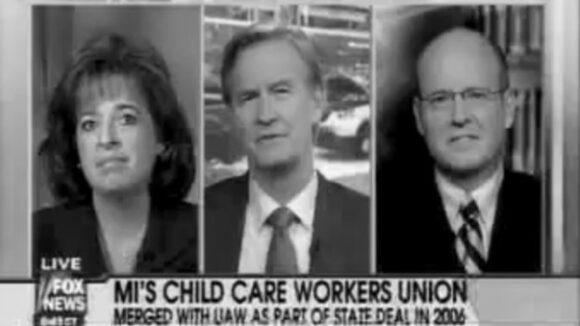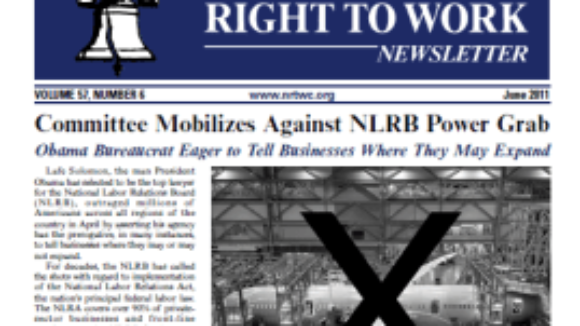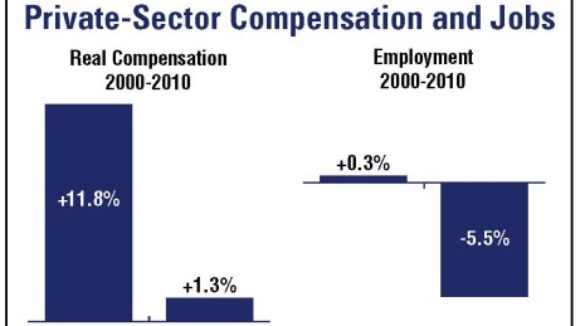Rules for Radicals
The former Chairman of the National Labor Relations Board is condemning the new “Quickie” election rule promulgated by the big labor dominated Board. Peter Schaumber insists the proposed…
The former Chairman of the National Labor Relations Board is condemning the new “Quickie” election rule promulgated by the big labor dominated Board. Peter Schaumber insists the proposed…

Intense and persistent lobbying by the National Right to Work Committee’s Tennessee members and supporters helped convince GOP legislators and Gov. Bill Haslam (R) to prohibit union monopoly bargaining in public schools. Credit: Chattanooga (Tenn.) Times Free Press Volunteer State Teacher Union Bosses Losing Monopoly Privileges This year, Right to Work proponents have scored a series of remarkable, though still mostly very tenuous, state victories over government union kingpins. In March, Wisconsin and Ohio became the first states ever to revoke government union bosses' privilege to get workers fired for refusal to pay dues or fees to an unwanted union after previously passing a law authorizing compulsory unionism. The following month, Right to Work Oklahoma passed legislation denying government union bosses the legal power to force municipal officials to recognize them as public employees' "exclusive" bargaining agents. And now Right to Work Tennessee has achieved another milestone by effectively repealing the mislabeled "Education Professional Negotiations" Act, which authorized and promoted union monopoly-bargaining control over teachers and other K-12 public school instructional employees. Union lobbyists rammed public school monopoly bargaining through the Tennessee Legislature in 1978. Big Labor puppet Gov. Ray Blanton (D) then eagerly signed the measure. As a consequence of the Blanton law, educators in 92 Tennessee school systems, roughly two-thirds of all the districts in the state, are currently forced to accept union monopoly bargaining in order to keep their jobs. The monopoly-bargaining system, now statutorily imposed on some or all state and local government employees in 36 states, hands union officials "exclusive" power to bargain over wages, benefits, and working conditions. 'We're Putting the Entire Education System at Risk' Even public employees who choose not to join a union must work under contract terms negotiated by union bosses, or quit their jobs. Independent-minded employees are stripped of any freedom to negotiate with employers on their own behalf.

Intense and persistent lobbying by the National Right to Work Committee’s Tennessee members and supporters helped convince GOP legislators and Gov. Bill Haslam (R) to prohibit union monopoly bargaining in public schools. Credit: Chattanooga (Tenn.) Times Free Press Volunteer State Teacher Union Bosses Losing Monopoly Privileges This year, Right to Work proponents have scored a series of remarkable, though still mostly very tenuous, state victories over government union kingpins. In March, Wisconsin and Ohio became the first states ever to revoke government union bosses' privilege to get workers fired for refusal to pay dues or fees to an unwanted union after previously passing a law authorizing compulsory unionism. The following month, Right to Work Oklahoma passed legislation denying government union bosses the legal power to force municipal officials to recognize them as public employees' "exclusive" bargaining agents. And now Right to Work Tennessee has achieved another milestone by effectively repealing the mislabeled "Education Professional Negotiations" Act, which authorized and promoted union monopoly-bargaining control over teachers and other K-12 public school instructional employees. Union lobbyists rammed public school monopoly bargaining through the Tennessee Legislature in 1978. Big Labor puppet Gov. Ray Blanton (D) then eagerly signed the measure. As a consequence of the Blanton law, educators in 92 Tennessee school systems, roughly two-thirds of all the districts in the state, are currently forced to accept union monopoly bargaining in order to keep their jobs. The monopoly-bargaining system, now statutorily imposed on some or all state and local government employees in 36 states, hands union officials "exclusive" power to bargain over wages, benefits, and working conditions. 'We're Putting the Entire Education System at Risk' Even public employees who choose not to join a union must work under contract terms negotiated by union bosses, or quit their jobs. Independent-minded employees are stripped of any freedom to negotiate with employers on their own behalf.

The Republican presidential field continues to grow but the recent announcement that House Rep. Thaddeus McCotter would join the race left most people scratching their heads. What does McCotter bring to the race? The most pro-forced unionism voting record…

The Republican presidential field continues to grow but the recent announcement that House Rep. Thaddeus McCotter would join the race left most people scratching their heads. What does McCotter bring to the race? The most pro-forced unionism voting record…

If the Obama-selected top lawyer for the National Labor Relations Board gets his way, Boeing will have no real choice but to abandon a brand-new $2 billion plant and 1,000 good jobs in Right to Work South Carolina. Obama Bureaucrat Eager to Tell Businesses Where They May Expand (Source: June 2011 NRTWC Newsletter) Lafe Solomon, the man President Obama has selected to be the top lawyer for the National Labor Relations Board (NLRB), outraged millions of Americans across all regions of the country in April by asserting his agency has the prerogative, in many instances, to tell businesses where they may or may not expand. For decades, the NLRB has called the shots with regard to implementation of the National Labor Relations Act, the nation's principal federal labor law. The NLRA covers over 90% of private-sector businesses and front-line employees. The NLRB is thus, no doubt, powerful. Nevertheless, the claim of power by NLRB Acting General Counsel Solomon in his April 20 complaint filed to block Boeing from initiating a new aircraft production line in Right to Work South Carolina is remarkable. As economist Arthur Laffer and senior Wall Street Journal editorial page economics writer Stephen Moore noted in a pungent op-ed appearing in the Journal May 13, this is "the first time a federal agency has intervened to tell an American company where it can and cannot operate a [new] plant within the U.S." Well-informed apologists for compulsory unionism like New York Times labor reporter Steven Greenhouse and former Clinton-appointed NLRB Chairman William Gould don't dispute that the Boeing complaint is, to quote Mr. Greenhouse, "highly unusual." Acting General Counsel: Sensible Business Decision Equals 'Anti-Union Animus'

Last year, Carrie Schlaud appeared on a Fox News broadcast along with Committee President Mark Mix to discuss her and other Michigan home day-care providers' efforts to defend their Right to Work. Credit: Fox News But Union Dons May Get to Keep $4.5 Million Wrung From Providers (Source: June 2011 NRTWC Newsletter) Five years ago, bosses of two AFL-CIO unions, the United Auto Workers (UAW) and the American Federation of State, County and Municipal Employees (AFSCME), teamed up to acquire forced-unionism control over home-based day-care providers in Michigan. The UAW/AFSCME joint-venture union, known as "Child Care Providers Together Michigan" (CCPTM), was set up with the express aim of unionizing "all home-based child [day] care providers in Michigan." Then-Gov. Jennifer Granholm, a Big Labor Democrat, was ready from the beginning to pull as many strings as necessary for the CCPTM union. In July 2006, Granholm-appointed bureaucrats helped establish a shell corporation known as the "Michigan Home Based Child Care Council" (MHBCC). The sole genuine purpose of this venture was to act as the entity against which the CCPTM union was supposedly organizing. Many of the 40,500 day-care providers targeted by CCPTM organizers report that they never even heard of this outfit until after it had prevailed in a low-turnout "mail ballot" election. In 2008, forced union fees began being siphoned out of the reimbursement checks day-care providers receive from the government for serving needy families who are unable to pay their own way. With Right to Work Attorneys' Help, Michigan Home Day-Care Providers Fought Back

The June 2011 issue of The National Right to Work Committee Newsletter is available for download in an Adobe pdf format for your convenience to read and share.

By prohibiting compulsory union dues, state Right to Work laws spur the growth of private-sector employee compensation in the form of wages, salaries, benefits and bonuses, as well as employment growth. Sources: U.S. Commerce Department, U.S. Labor Department Private-Sector Compensation Growth Lags in Forced-Unionism States (Source: June 2011 NRTWC Newsletter) Even union bosses and their apologists sometimes grudgingly admit that long-term private-sector job growth in states that currently have Right to Work laws on the books far outpaces job growth in states that lack such pro-employee statutes. This fact is indeed hard to deny. From 1990 to 2010, according to the U.S. Labor Department, private-sector payrolls in Right to Work states soared by 32.0% -- an increase triple that of forced-union-dues states combined. Over the past decade alone, nationwide private-sector employment fell by 3.3% due to the impact of the severe 2008-2009 recession. But Right to Work states experienced an overall private-sector job increase, while forced-unionism states suffered a 5.5% aggregate job loss. Big Labor tries to downplay the significance of Right to Work states' large, persistent employment-growth advantage by suggesting that the jobs created outside of forced unionism's dominion are "the wrong kind." Unfortunately for union propagandists, however, U.S. Commerce Department data show that Right to Work states also enjoy a large, persistent advantage over forced-unionism states with regard to growth of private-sector employee compensation (including wages, salaries, bonuses and benefits). Real Compensation Grew Nine Times as Much Over Past Decade In Right to Work States